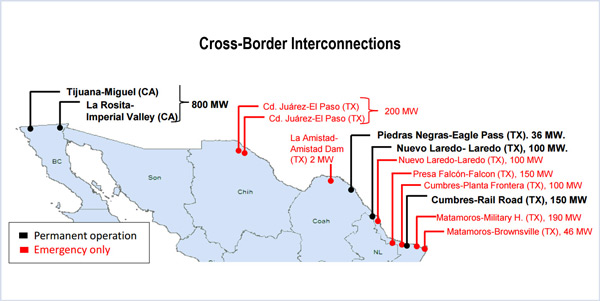By Tom Kleckner
Texas regulators are concerned that transmission projects along the U.S. border with Mexico may threaten their exclusive jurisdiction over ERCOT.
In a Nov. 16 memo to Commissioners Brandy Marty Marquez and Arthur D’Andrea, Public Utility Commission Chair DeAnn Walker said a pair of recent developments could place the electrical separation between ERCOT and the rest of the country “in jeopardy” by allowing energy to flow between Texas and other states through Mexico’s national grid. ERCOT has several synchronous (alternating current) and asynchronous (direct current) ties with the Mexican grid.
Walker pointed to Nogales Transmission’s application for a presidential permit to build an HVDC interconnection between Arizona and Mexico (OE PP-420). The project would consist of a 150-MW substation in Tucson Electric Power’s service territory, capable of being expanded to 300 MW; a 138-kV transmission line on the Arizona side near the city of Nogales; and a 230-kV line across the border that would connect to the Mexican grid. Nogales Transmission is a subsidiary of Dallas-based Hunt Power.
Walker also is concerned about an HVDC line linking the Mexican state of Baja California with the country’s central grid. That project, in the advanced planning stage, would provide a major tie between Mexico and California, which already has two connections with Baja California with a total capacity of 800 MW. In addition, California’s Imperial Irrigation District (IID) signed an agreement with CENACE, Mexico’s grid operator earlier this year, to study the exchange of up to 600 MW of energy with Baja California. IID has said the two have plans for a pair of interties to be completed in 2019 and 2020.
The Baja California system is part of the Western Electricity Coordinating Council (WECC) and not interconnected with the rest of Mexico. Sempra Energy also has a presidential permit that allows it to import renewable energy from Baja California, helping make up for the loss of the San Onofre Nuclear Generating Station.
“Those are issues that will occur outside of the United States for which the [Texas] commission will likely have no notice or participation opportunities,” Walker told Marquez and D’Andrea.
The chairwoman said FERC staff contacted the PUC “to convey concern” that the Nogales interconnection could affect FERC’s jurisdiction over ERCOT. A FERC order in 2007 noted that electricity generated within ERCOT and transmitted across a Sharyland Utilities DC tie to Mexico could not flow into WECC territory “because the Baja California system is not interconnected with the national Mexico grid,” she said.
“I’m very, very concerned about it,” Walker said. “Even if they take care of the issues in Arizona, I still have concerns about the impacts in California. We need a solution. This isn’t something we’re going to sit back and wait for it to happen.”
Nogales Transmission has asked the Department of Energy to delay processing its presidential permit until it can obtain “the necessary FERC disclaimer” of jurisdiction, Walker said.
Walker noted in her memo that FERC could exert its jurisdiction over ERCOT through the Commerce Clause of the U.S. Constitution “if the commingling of power between ERCOT and the rest of the United States occurs.”
Because ERCOT administers the Texas Interconnection — located solely within the state and not synchronously interconnected with the rest of the U.S. — FERC generally does not have jurisdiction over the ISO. There are several DC lines between Texas and other U.S. states; developers of these lines must seek a declaratory order from FERC saying they will not affect ERCOT’s independent status.
Under the Federal Power Act, FERC has no jurisdiction over transmission lines that cross international boundaries if they don’t also cross U.S. state lines.
Walker has already met with the leadership of AEP Texas, CenterPoint Energy, Oncor and Sharyland to discuss the situation. AEP and Sharyland own the state’s three DC ties with Mexico.
Walker noted the Nogales project would transmit from Arizona to the Mexican transmission system, to which Sharyland is already connected. “The change of circumstances suggests that Sharyland, ERCOT and other market participants should seek an order from FERC that they will retain their nonpublic utility status” under the FPA, Walker said.
ERCOT’s independence “is not only a source of pride, but it makes our market work so well,” Marquez said during the commission’s Nov. 17 open meeting. “We have to explore every opportunity to preserve and protect our jurisdiction.” She said she would be working with ERCOT staff to see “what types of mechanisms we can use” to protect the ISO’s independence.






